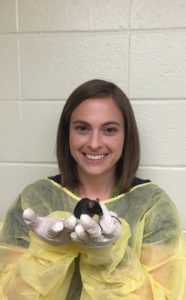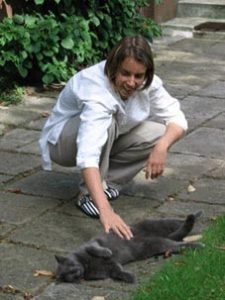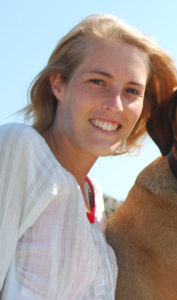Contributors

Dr. Joseph Garner
Joe was recently (2011) appointed as an Associate Professor in the Department of Comparative Medicine, and a Courtesy Associate Professor in the Department of Psychiatry and Behavioral Sciences, at Stanford University. Joe received his doctoral degree from the Department of Zoology at the University of Oxford, Great Britain, where he studied the developmental neuroethology of stereotypies in captive animals (1995-1999). His postdoctoral research in animal behavior and well-being was undertaken at UC Davis (1999-2004). He served as an Assistant (2004-2010) and an Associate (2010-2011) Professor of animal behavior and well-being in the Department of Animal Sciences at Purdue University, Show / Hide
Stanford website: med.stanford.edu/profiles/Joseph_Garner

Dr. Brianna Gaskill
Dr. Gaskill received her BS from Kansas State University in 2004 and her PhD in animal behavior and well-being from Purdue University in 2011. After graduation, she spent 2.5 years as a postdoctoral research scientist at Charles River, studying the behavior and well-being of laboratory rodents. She is currently an assistant professor of animal welfare at Purdue University in the comparative pathobiology department and has a courtesy appointment in Animal Sciences. Her previous research has covered behavioral and physiological thermoregulation of mice in laboratories and its impact on mouse well-being. Additionally she has been involved in developing new and improved types of cognitive testing for mice that are used in psychiatric and neuroscience research. Brianna’s other research interests include Show / Hide

Cathleen Rodda
Cathleen Rodda is currently a graduate student in the Alberts lab at Indiana University. She earned her first bachelor’s degree, in psychology, and a second in Animal Sciences (with a specialisation in animal behavior and welfare), from Purdue University. Between degrees she spent almost 2 years working as a Child and Adolescent Case Manager. Almost a year after returning to school for her degree in animal science, Cathleen began working for Dr. Joseph Garner, doing research on the behavior and biology of laboratory mice. She received funding from the Purdue University Undergraduate Research Fellowship to help create this web based ethogram.

Brett Dufour
Brett Dufour is a senior research assistant at Oregon Health & Science University in the Department of Neurosurgery Research. He completed his MS degree at Purdue University, investigating the role of nutritional up-regulation of serotonin in the treatment of barbering behavior and the development of ulcerative dermatitis. He has worked with Joe Garner on research projects involving abnormal repetitive behavior in mice for over 5 years, and is responsible for creating the first version of this ethogram.

Aria Prater
Aria graduated in 2003 from the University of California at Davis with Bachelor's Degrees in French and Animal Science. Her undergraduate studies and internships helped develop her desire to improve animal welfare in research and promote humane education curriculum in the biological sciences. She implemented these goals in her positions at the University of California at San Francisco, in both the Laboratory Animal Resource Center and the Institutional Animal Care and Use Committee, and as a certified high school educator. She is currently pursuing RVT certification and work in animal shelter medicine and sanctuaries.

Jon Klein
Jon Klein is a PhD student in Purdue University’s PULSe program. He is a member of the Integrative Neuroscience research group with a focus on using animal models for abnormal behaviors. Jon graduated from Purdue in 2009 with a BS in Biology and a minor in philosophy. Previously he has helped with research in nutritional influences on brain serotonin levels and barbering and development of a device to remotely monitor laboratory mouse health.

Dr. Hanno Würbel
Hanno Würbel, Dr.sc.nat, has studied biology (zoology) at the University of Berne (Switzerland) and graduated from the ETH Zurich (Switzerland) in 1996 with a thesis on the development of stereotypies in laboratory mice. Funded by the Swiss National Science Foundation he continued research on stereotypies in mice as a postdoc in the group of Christine Nicol at the University of Bristol (UK). Back at ETH Zurich, he started to develop a research program on environment-dependent plasticity of brain and behavior in relation to questions of animal husbandry and Show / Hide

Dr. Georgia Mason
As a child, I loved animals and was addicted to the books of Gerald Durrell, James Herriot and David Attenborough. In my teens, this merged with a passion for biological science -- fuelling the uncertain feeling that I should probably be a veterinarian. However, once a pre-clinical veterinary student at Cambridge (vet. med. is an undergraduate degree in the UK), six terms of anatomy and pharmacology, and two summers spent squeezing dogs’ anal glands and castrating piglets, were enough for me! I switched to Zoology – and have never looked back. Learning about animal behaviour and evolution, and about how research is conducted, Show / Hide

Dr. Anna Olsson
Already as an undergraduate student in Animal Sciences at the Swedish University of Agricultural Sciences, I realized that there was more to animal science than making cows give more milk. When graduating in 1994, I had settled for ethology and animal welfare as my professional habitat, which I haven’t left since. Having completed my PhD in ethology, also at the Swedish University of Agricultural University, in 2001 I started my postdoc career by going against all recommendations, moving to work with something I had never worked with – laboratory rodent behaviour Show / Hide

Elin Weber
I have a MSc in Biology from Gothenburg university and work as a PhD student at the department of animal environment and health at the Swedish University of Agricultural Sciences (SLU) in Skara, Sweden. I have always had a great interest in ethology and especially welfare of lab animals and I started working with laboratory animal behaviour and welfare in 2004 when I did my master project on maternal behaviour in mice at the Institute for Molecular and Cell Biology, Porto Portugal, with Anna Olsson as main supervisor. During that work we realized how common it is that mouse pups die short after parturition and also, the lack of knowledge on why the pups die. This lead to my PhD project and I now work with maternal behaviour and perinatal mortality in laboratory mice. I mainly work with behaviour observations and Show / Hide

Jerome Geronimo
Jerome is currently the Lab Manager/Webmaster/Project Manager/Research Assistant for Dr. Joseph Garner's lab at Stanford University. He has been at Stanford since 2009. Jerome received his Bachelor's from the Ira A. Fulton School of Engineering at Arizona State University (summa cum laude) and is currently enrolled as a graduate student of the Masters in Laboratory Animal Science program at Stanford University.

Cade May
Cade May is an undergraduate at Stanford University, and a member of Stanford's Class of 2019. Cade was responsible for designing and converting the mousebehavior.org website to a WordPress site.
